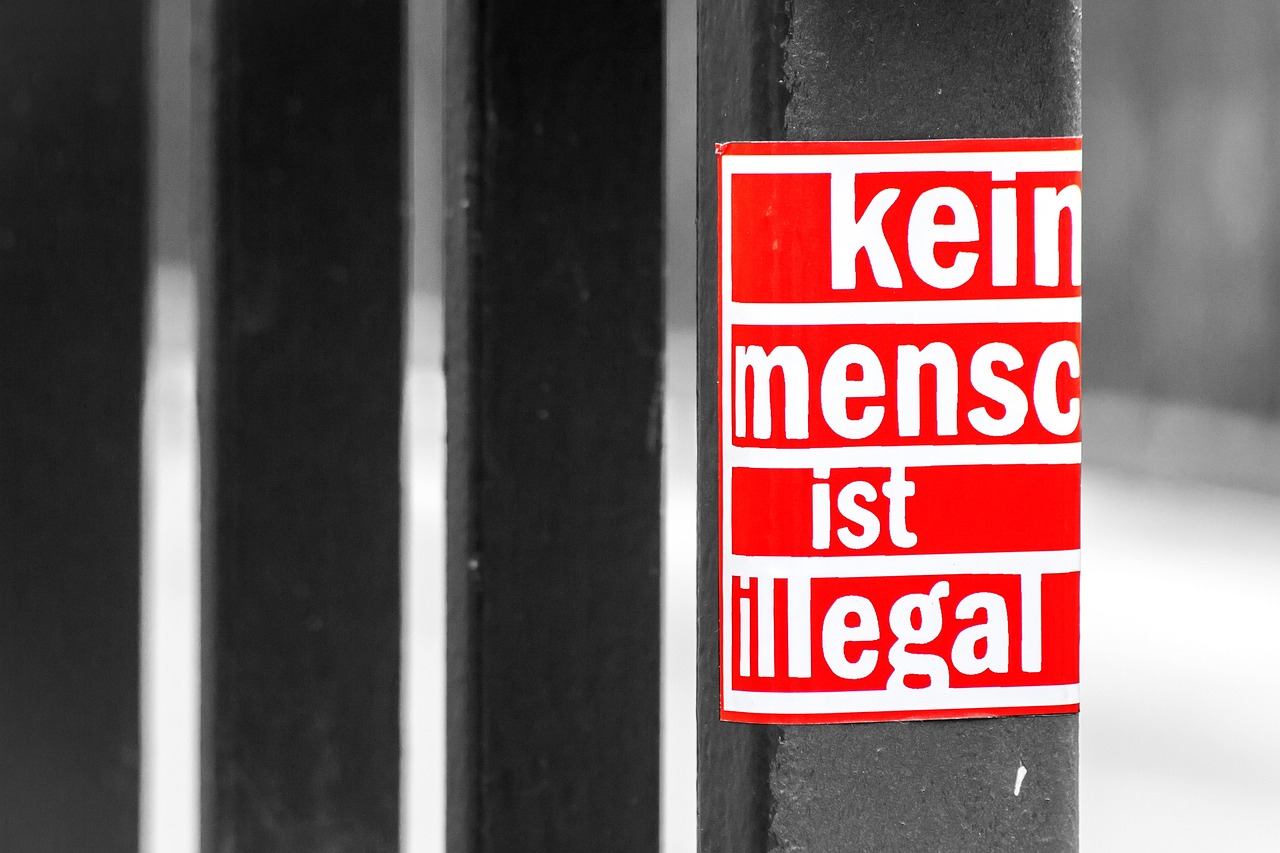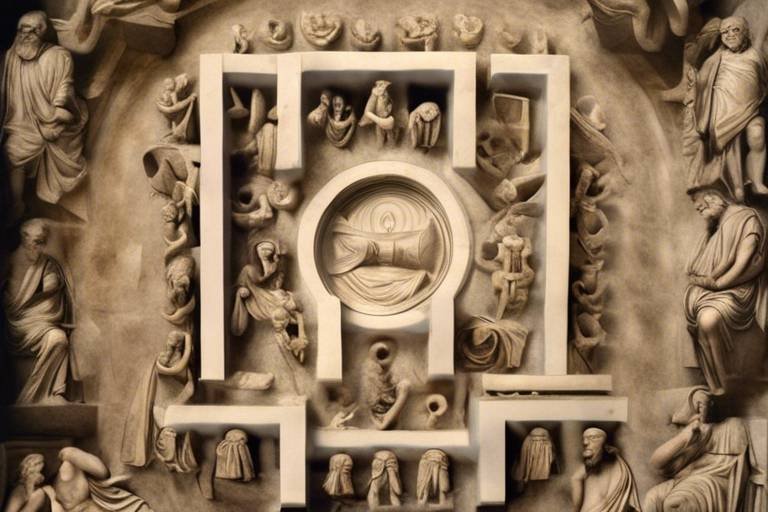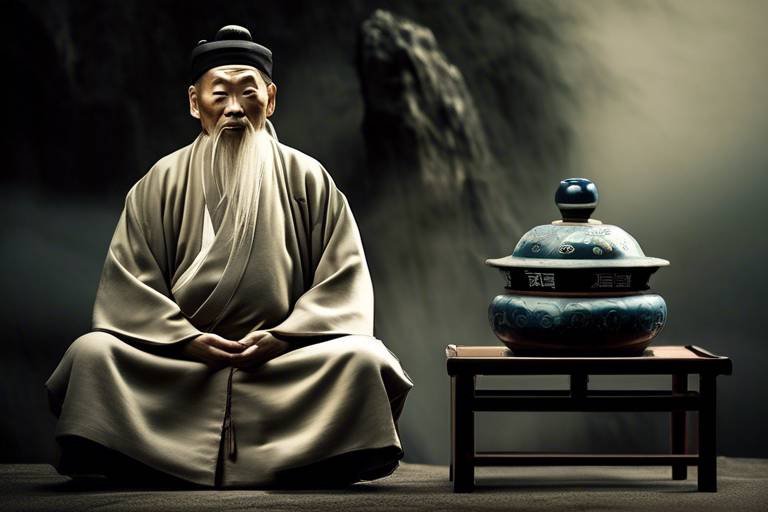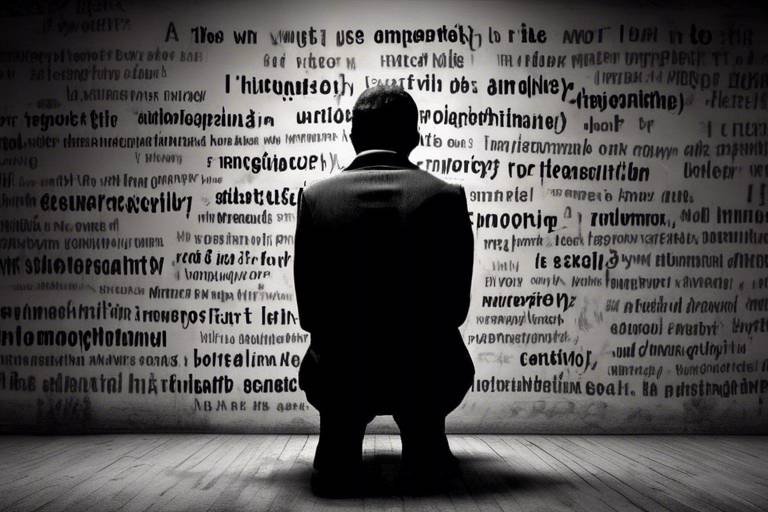The Philosophy of Rights - A Comprehensive Analysis
The philosophy of rights is a fascinating and complex field that intertwines with ethics, law, and social justice. It invites us to ponder fundamental questions about what it means to have rights and how these rights shape our interactions within society. At its core, the philosophy of rights seeks to understand the nature, origin, and implications of rights that individuals possess, whether they are inherent or granted by legal systems. This exploration not only sheds light on historical perspectives but also engages with contemporary debates that challenge our understanding of justice and morality.
Throughout history, various thinkers and movements have contributed to the evolution of rights. From ancient philosophies that emphasized natural law to modern legal frameworks that delineate civil liberties, the concept of rights has undergone significant transformations. These shifts reflect broader societal changes, including revolutions, wars, and the ongoing struggle for equality. By examining these historical foundations, we can appreciate how far we've come and recognize the work that still lies ahead in securing rights for all.
One of the most critical distinctions in the philosophy of rights is between natural rights and legal rights. Natural rights are often viewed as universal entitlements inherent to all human beings, such as the right to life, liberty, and the pursuit of happiness. In contrast, legal rights are established by legal systems and can vary significantly from one jurisdiction to another. This dichotomy raises essential questions about the moral legitimacy of laws and the role of government in protecting or infringing upon individual rights.
As we delve deeper into this topic, we will encounter influential philosophers like John Locke, who championed the idea of natural rights and argued that they are essential for a just society. Locke's belief that individuals possess rights simply by virtue of being human laid the groundwork for many modern democratic principles. However, his theories have also faced critiques, particularly from utilitarian and social contract theorists, who challenge the notion of inherent rights and advocate for a more pragmatic approach to ethics and governance.
In today's society, legal rights play a pivotal role in safeguarding individual freedoms and promoting social justice. Laws are formulated and enforced to protect these rights, yet they are not always perfect. The relationship between legal rights and moral philosophy is intricate, as laws can sometimes conflict with ethical principles. This tension invites us to consider how we can create a legal framework that not only respects individual rights but also promotes the greater good.
As we navigate through the complexities of rights, we must also engage with the global perspective. The philosophy of rights is not a one-size-fits-all concept; it varies across cultures and societies. The Universal Declaration of Human Rights serves as a significant milestone in promoting global standards for human rights, yet its implementation often faces challenges due to cultural relativism. This raises critical questions about the universality of rights and how cultural contexts influence their interpretation and enforcement.
In conclusion, the philosophy of rights is a rich and dynamic field that continues to evolve. It challenges us to think critically about the nature of rights, their implications for justice, and the moral responsibilities we hold toward one another. As we explore this topic further, we will uncover the nuances of rights in moral philosophy, the impact of legal frameworks, and the ongoing debates that shape our understanding of justice in a diverse world.
- What are natural rights? Natural rights are fundamental rights that every individual possesses simply by being human, regardless of laws or government.
- How do legal rights differ from natural rights? Legal rights are granted and enforced by legal systems, while natural rights are inherent and universal.
- Who was John Locke? John Locke was a 17th-century philosopher known for his contributions to political philosophy, particularly the concept of natural rights.
- What is the Universal Declaration of Human Rights? It is a milestone document adopted by the United Nations that outlines fundamental human rights to be universally protected.

Historical Foundations of Rights
The concept of rights has a rich and complex history that stretches back thousands of years, deeply intertwined with the evolution of human societies and moral philosophies. From ancient civilizations to modern democracies, the understanding of rights has transformed significantly, shaped by various thinkers, social movements, and historical events. At the core of this evolution is the quest for justice and equality, a theme that resonates throughout human history.
In ancient times, the idea of rights was often linked to the divine or the natural order. For instance, the Code of Hammurabi, dating back to around 1754 BC, laid down laws that provided a framework for justice in Babylon. This early legal code is one of the first examples of formalized rights, albeit limited to the elite. As societies evolved, so did the notion of rights, moving from divine mandates to human-centric principles.
Fast forward to the Enlightenment period in the 17th and 18th centuries, and we see a dramatic shift in the philosophy of rights. Thinkers like John Locke and Jean-Jacques Rousseau began to advocate for natural rights—those rights inherent to all individuals simply by being human. Locke’s famous assertion that individuals possess rights to life, liberty, and property laid the groundwork for modern democratic thought. His ideas ignited revolutionary movements, influencing the American and French Revolutions and leading to the establishment of documents like the U.S. Declaration of Independence and the Declaration of the Rights of Man and of the Citizen.
Throughout the 19th and 20th centuries, the philosophy of rights continued to evolve, fueled by social movements advocating for civil rights, women’s rights, and labor rights. The abolition of slavery, the suffrage movement, and the civil rights movement in the United States were pivotal in reshaping societal norms and legal frameworks. These movements emphasized the idea that rights are not merely privileges granted by the state but fundamental entitlements that should be universally recognized.
Today, the historical foundations of rights serve as a cornerstone for contemporary discussions about justice, equality, and human dignity. Various international agreements, such as the Universal Declaration of Human Rights adopted by the United Nations in 1948, reflect a global consensus on the importance of protecting individual rights regardless of nationality, gender, or religion. However, the journey is far from over, as ongoing debates about the balance between individual rights and collective responsibilities continue to challenge our understanding of rights in a globalized world.
As we explore the historical foundations of rights, it becomes evident that this journey is not just about laws or philosophical theories; it is about the lived experiences of individuals and communities striving for recognition and justice. The dialogue surrounding rights is dynamic, constantly influenced by cultural, social, and political contexts, reminding us that the fight for rights is a universal struggle that transcends time and geography.
- What are natural rights?
Natural rights are those rights that individuals possess inherently, not granted by any government or authority. They include the right to life, liberty, and property, as famously articulated by John Locke. - How did the Enlightenment influence modern rights?
The Enlightenment introduced the idea that rights are universal and should be protected by governments, significantly influencing democratic principles and human rights legislation. - What is the significance of the Universal Declaration of Human Rights?
Adopted in 1948, this declaration set a global standard for human rights, affirming that all individuals are entitled to basic rights and freedoms, regardless of their background.

Natural Rights vs. Legal Rights
The distinction between natural rights and legal rights is a cornerstone of philosophical discourse, shaping our understanding of justice, ethics, and governance. At its core, the debate revolves around the source and legitimacy of rights. Natural rights are often viewed as inherent and universal, existing independently of any legal framework. They are considered fundamental entitlements that every human possesses simply by virtue of being human. Think of them as the innate privileges that come with life itself—like the right to breathe, to express oneself, and to pursue happiness. These rights are often articulated in the language of morality and ethics, suggesting that they are not granted by any authority but are instead intrinsic to our existence.
On the other hand, legal rights are those that are established and enforced by a legal system. They are defined by statutes, regulations, and judicial decisions, and can vary significantly from one jurisdiction to another. Legal rights are like the rules of a game; they are created by society to maintain order and protect individuals. For instance, the right to vote is a legal right that exists because of laws enacted by governments. This distinction raises critical questions: Are legal rights merely reflections of society's moral standards, or do they hold a legitimacy of their own? And what happens when legal rights conflict with natural rights?
To illustrate this further, consider the following table that outlines key differences between natural rights and legal rights:
| Aspect | Natural Rights | Legal Rights |
|---|---|---|
| Source | Inherent to human nature | Established by legal systems |
| Universality | Applicable to all humans | Varies by jurisdiction |
| Enforcement | Not enforceable by law | Enforced by governmental institutions |
| Examples | Right to life, liberty, and property | Right to vote, right to a fair trial |
This table helps clarify the fundamental differences between these two types of rights. While natural rights are seen as universal and unalienable, legal rights can be created, modified, or even revoked by legislative bodies. This brings us to the heart of the debate: the implications of these differences on moral philosophy and political theory. When legal rights infringe upon what many would consider natural rights, it raises ethical dilemmas that challenge our understanding of justice. For example, laws that permit discrimination based on race or gender could be seen as violating the natural rights of individuals, leading to public outcry and demands for reform.
Moreover, the tension between natural and legal rights often plays out in contemporary debates over issues such as human rights, freedom of speech, and privacy. Advocates for natural rights argue that these entitlements should be upheld regardless of legal frameworks, while proponents of legal rights emphasize the necessity of laws to protect societal order. This ongoing dialogue is crucial as societies evolve and grapple with the complexities of governance and individual freedoms.
In essence, the discourse surrounding natural rights versus legal rights is not merely academic; it has real-world implications that affect legislation, social justice movements, and individual freedoms. As we navigate this intricate landscape, it is essential to recognize that the interplay between these two concepts will continue to shape our understanding of rights and responsibilities in a rapidly changing world.
- What are natural rights? Natural rights are fundamental human entitlements that are considered inherent and universal, such as the right to life and liberty.
- How do legal rights differ from natural rights? Legal rights are established by laws and can vary by jurisdiction, while natural rights are seen as universal and not dependent on legal systems.
- Can legal rights override natural rights? This is a contentious issue; many argue that legal rights should not infringe upon natural rights, while others believe that laws are necessary for societal order.
- Why is the distinction between these rights important? Understanding the difference helps inform debates on justice, ethics, and governance, and influences how laws are created and enforced.

John Locke and Natural Rights
When we think about the concept of natural rights, one name that often comes to mind is John Locke. This 17th-century philosopher laid the groundwork for modern human rights theory with his revolutionary ideas. Locke proposed that every individual is born with certain inalienable rights that are not granted by any government or institution but are inherent to human existence. These rights, as Locke articulated, include life, liberty, and property. Imagine being born into a world where your very existence is tied to these fundamental rights—it's a powerful notion that has shaped political thought for centuries.
Locke believed that these natural rights were universal and should be respected by all individuals and governments. He argued that the primary role of government is to protect these rights. If a government fails to do so, Locke contended that citizens have the right to revolt. This idea was radical at the time and laid the foundation for many democratic movements around the globe. To understand Locke's influence, consider the following key points:
- Life: The right to live and not be harmed by others.
- Liberty: The freedom to act according to one's own will, as long as it does not infringe on the rights of others.
- Property: The right to own and control personal belongings and resources.
Locke's thoughts on natural rights were not merely theoretical; they had profound implications for the development of modern democracies. His ideas influenced the American Declaration of Independence, where Thomas Jefferson echoed Locke's philosophy by stating that individuals are endowed with certain unalienable rights, including life, liberty, and the pursuit of happiness. This connection between Locke's theory and practical governance highlights how philosophical concepts can transcend time and geography.
However, Locke's theory has not gone unchallenged. Critics argue that his emphasis on individual rights can lead to a neglect of community and social responsibilities. For instance, some utilitarian philosophers contend that the greatest good for the greatest number should take precedence over individual rights. They question whether it is justifiable for one person's rights to outweigh the well-being of the majority. Additionally, social contract theorists have critiqued Locke, suggesting that rights should be understood within the context of societal agreements rather than as inherent entitlements.
Despite these critiques, Locke's contributions to the philosophy of natural rights remain significant. His work encourages us to reflect on the balance between individual rights and the collective good. In a world where discussions about rights are more relevant than ever, Locke's ideas continue to resonate, prompting us to consider what it truly means to be free and just in our societies.

Locke's Influence on Modern Democracies
John Locke, a towering figure in the realm of political philosophy, has left an indelible mark on the foundations of modern democracies. His seminal work, particularly in the "Two Treatises of Government," introduced revolutionary ideas that challenged the status quo of absolute monarchy and laid the groundwork for liberal democratic thought. Locke's assertion that individuals possess inherent rights to life, liberty, and property fundamentally shifted the paradigm of governance, emphasizing that the legitimacy of government derives from the consent of the governed.
Locke's influence can be seen in various democratic frameworks around the world today. For instance, the principles enshrined in the United States Declaration of Independence echo Locke's philosophy, particularly the assertion that all men are created equal and endowed with certain unalienable rights. This connection is not merely coincidental; the Founding Fathers were heavily inspired by Locke's ideas, viewing government as a social contract designed to protect the rights of individuals.
Moreover, Locke's emphasis on the separation of powers has been crucial in shaping modern democratic institutions. By advocating for a system where legislative, executive, and judicial powers are distinct, Locke aimed to prevent the concentration of power that could lead to tyranny. This idea is mirrored in the structure of many contemporary governments, where checks and balances are essential to maintaining a fair and just society.
To illustrate Locke's impact further, consider the following key aspects of his philosophy and their relevance to modern democracies:
| Locke's Ideas | Modern Democratic Principles |
|---|---|
| Natural Rights | Human Rights |
| Government by Consent | Electoral Systems |
| Separation of Powers | Checks and Balances |
| Right to Revolution | Democratic Movements |
Locke also championed the idea of the right to revolution, positing that if a government fails to protect the rights of its citizens, those citizens have the right to overthrow it. This notion has fueled numerous democratic movements and revolutions throughout history, empowering individuals to challenge oppressive regimes and demand their rights. From the American Revolution to the French Revolution, Locke's ideas have inspired countless individuals to fight for their freedoms.
In conclusion, John Locke's philosophy has not only shaped the theoretical underpinnings of modern democracies but has also manifested in practical governance structures that prioritize individual rights and freedoms. His legacy continues to resonate today, reminding us of the importance of protecting our natural rights and holding our governments accountable. As we navigate contemporary issues of governance and rights, Locke's insights remain a guiding light, urging us to strive for a society where liberty and justice prevail for all.
- What are John Locke's main contributions to political philosophy?
Locke's main contributions include the concepts of natural rights, government by consent, and the right to revolution. His ideas have profoundly influenced democratic thought and practice.
- How did Locke's ideas influence the American Revolution?
Locke's philosophy inspired the Founding Fathers to assert the importance of individual rights and the need for government to protect these rights, leading to the Declaration of Independence.
- What is the significance of the separation of powers in Locke's theory?
The separation of powers is crucial to preventing tyranny and ensuring that no single entity holds excessive power, which is a foundational principle in many democracies today.

Critiques of Locke's Theory
John Locke's theory of natural rights has been a cornerstone in the philosophy of rights, but it hasn't been without its fair share of critiques. One of the most significant challenges comes from the utilitarian perspective, which argues that the emphasis on individual rights can sometimes lead to outcomes that are not beneficial for the greater good. Utilitarians often prioritize the well-being of the majority over the rights of individuals, suggesting that a rigid adherence to Locke's principles might result in societal harm. For instance, if protecting an individual's right to property means depriving a community of essential resources, the utilitarian would argue for a reevaluation of that right in favor of collective welfare.
Moreover, social contract theorists have also raised questions about the universality of Locke's natural rights. They contend that rights are not inherent but rather constructed through social agreements and the context of political society. This perspective challenges the notion that rights exist independently of societal structures, suggesting instead that they are contingent upon the agreements made by individuals within a society. For example, the rights that one might enjoy in a democratic society could be vastly different from those in an authoritarian regime, indicating that rights are not as universal as Locke proposed.
Additionally, some critics point out that Locke's framework does not adequately address the complexities of inequality and power dynamics in society. They argue that his theory assumes a level playing field where all individuals have equal access to rights and opportunities. However, in reality, systemic inequalities often inhibit individuals from fully exercising their rights. This critique highlights the need for a more nuanced understanding of rights that takes into account socio-economic factors and historical injustices, which Locke's theory seems to overlook.
Furthermore, Locke's focus on property rights has been criticized for fostering a materialistic worldview that can lead to environmental degradation. By prioritizing individual ownership and accumulation of wealth, Locke's philosophy may inadvertently encourage exploitation of natural resources, raising ethical questions about our responsibilities toward the environment and future generations. In light of climate change and ecological crises, this critique becomes increasingly relevant, prompting a reevaluation of how rights should be conceptualized in relation to our planet.
In summary, while John Locke's contributions to the philosophy of rights are undeniably influential, they are not without limitations. The critiques from utilitarianism, social contract theory, and considerations of inequality and environmental ethics serve to enrich the discourse surrounding rights, encouraging a more comprehensive understanding that can adapt to contemporary challenges.
- What are natural rights? Natural rights are those rights that individuals are believed to possess inherently, regardless of legal recognition. They are often associated with fundamental human entitlements like life, liberty, and property.
- How did Locke influence modern democracy? Locke's ideas on natural rights laid the groundwork for democratic principles, emphasizing the importance of individual rights and the social contract, which inspired many democratic movements and human rights legislation.
- What is the difference between natural rights and legal rights? Natural rights are universal and inherent to all individuals, while legal rights are granted and enforced by legal systems, varying from one jurisdiction to another.
- Why are Locke's theories criticized? Critics argue that Locke's theories can overlook the complexities of societal inequalities, the need for collective welfare, and environmental responsibilities, suggesting a need for a more holistic approach to rights.

Legal Rights in Contemporary Society
In our fast-paced world, the notion of legal rights serves as the backbone of societal structure, providing individuals with a framework within which they can operate freely and justly. These rights are not merely theoretical constructs; they are the result of centuries of legal evolution, shaped by cultural, political, and social influences. Legal rights are defined by the laws of a particular society, which can vary significantly from one jurisdiction to another. This variability raises intriguing questions: Are legal rights enough to ensure justice, or do they sometimes fall short in protecting the most vulnerable among us?
Legal rights come into play in numerous aspects of daily life, from the right to free speech and assembly to the right to a fair trial. These rights are typically enshrined in constitutions, statutes, and international treaties, serving as a safeguard against abuses of power. However, the enforcement of these rights often encounters challenges. For example, while many countries have laws that guarantee freedom of expression, the reality can be starkly different. Governments may impose restrictions, leading to a disconnect between what is legally permissible and what is practically experienced. This gap highlights the importance of not just having legal rights, but also ensuring they are upheld and respected.
One of the most pressing issues surrounding legal rights today is the question of access to justice. Many individuals, particularly those from marginalized communities, face significant barriers in asserting their rights. Factors such as economic status, education, and systemic discrimination can inhibit one's ability to navigate the legal system. As a result, the concept of legal rights must be paired with efforts to enhance accessibility and equity within legal frameworks. This is where advocacy groups and civil society organizations play a crucial role, working tirelessly to bridge the gap between legal entitlements and the lived realities of individuals.
Moreover, the digital age has introduced new dimensions to legal rights. With the rise of the internet and social media, issues such as privacy rights, data protection, and online harassment have come to the forefront. Laws are continually evolving to address these challenges, but the pace often lags behind technological advancements. For instance, the General Data Protection Regulation (GDPR) in the European Union represents a significant step forward in protecting individuals' privacy rights in a digital landscape, yet similar protections are still lacking in many parts of the world.
In summary, legal rights are essential for maintaining order and justice in contemporary society. However, their effectiveness hinges on the willingness of both individuals and institutions to uphold them. As we navigate the complexities of modern life, it is vital to remain vigilant and proactive in advocating for the rights that protect our freedoms and dignity.
- What are legal rights? Legal rights are entitlements granted by a legal system that allow individuals to act or be treated in certain ways.
- How do legal rights differ from natural rights? Legal rights are established by laws and can vary by jurisdiction, whereas natural rights are inherent and universal, often considered fundamental to human existence.
- Why is access to justice important? Access to justice ensures that individuals can assert their rights and seek remedies for violations, which is critical for upholding the rule of law and protecting vulnerable populations.
- How do digital advancements affect legal rights? The rise of technology introduces new challenges related to privacy, data protection, and online behavior, requiring ongoing legal adaptations to safeguard individual rights.

Rights and Moral Philosophy
The relationship between rights and moral philosophy is a complex and fascinating area of study. At its core, this intersection raises profound questions about what it means to have rights and the ethical obligations that come with them. Rights are often seen as inherent entitlements that individuals possess, but the philosophical underpinnings of these rights can vary significantly based on different ethical theories. This leads us to ponder: Are rights simply social constructs, or do they have a more profound, universal basis?
To dive deeper, we can categorize the philosophical approaches to rights into two main schools: utilitarianism and deontology. Each offers a distinct lens through which we can evaluate the importance and implications of rights in society.
Utilitarianism is grounded in the principle of maximizing overall happiness or utility. From this perspective, rights are not absolute; rather, they are contingent upon their ability to promote the greatest good for the greatest number. For instance, a utilitarian might argue that individual rights can be overridden if doing so leads to a better outcome for the majority. This raises ethical dilemmas, such as when the rights of a minority are sacrificed for the sake of collective happiness. Imagine a scenario where a community decides to restrict the freedoms of a few to enhance the security of many. Is this justifiable? Utilitarianism would suggest that it is, as long as the overall happiness is increased. However, this can lead to a slippery slope where individual rights are consistently compromised in favor of the majority.
On the other hand, deontological ethics, championed by philosophers like Immanuel Kant, posits that certain actions are inherently right or wrong, regardless of their consequences. In this view, rights are fundamental and must be respected because they stem from moral duties. For example, a deontologist would argue that every individual has a right to free speech, and this right should not be violated, even if restricting it could lead to a more harmonious society. This perspective emphasizes the significance of moral principles, asserting that respecting rights is a duty that must be upheld, irrespective of the outcomes. It introduces a critical question: Should we prioritize the protection of individual rights even when it might lead to undesirable consequences?
As we navigate these philosophical waters, it becomes clear that the discourse surrounding rights is not merely academic; it has real-world implications. The way we interpret rights influences laws, social policies, and our moral compass as a society. For instance, debates surrounding issues like freedom of expression, privacy rights, and social justice often hinge on these philosophical underpinnings. Understanding whether we view rights as absolute or conditional can significantly shape our approach to legislation and governance.
Moreover, the global context adds another layer of complexity. Different cultures and societies may prioritize rights differently based on their unique moral frameworks. This cultural relativism challenges the notion of universal rights and raises questions about the applicability of certain rights across diverse contexts. For example, while some cultures may emphasize individual autonomy, others might prioritize community welfare. This divergence can lead to conflicts in international human rights discussions and necessitates a nuanced understanding of how rights are perceived worldwide.
In summary, the relationship between rights and moral philosophy is intricate and multifaceted. Whether one subscribes to the utilitarian approach, which often weighs the collective benefit over individual entitlements, or the deontological perspective, which upholds the inviolability of rights, the implications are profound. As we continue to grapple with these ideas, it is essential to engage in thoughtful dialogue about how we define, protect, and promote rights in our societies.
- What are rights in moral philosophy? Rights in moral philosophy refer to the entitlements that individuals possess, which are often discussed in relation to ethical theories that justify or critique these entitlements.
- How do utilitarianism and deontology differ in their approach to rights? Utilitarianism prioritizes the greatest good for the greatest number, often allowing for the infringement of individual rights for collective benefit, while deontology asserts that certain rights are inviolable, regardless of the consequences.
- Can rights be universal? The universality of rights is debated, particularly in light of cultural relativism, which suggests that rights may be interpreted differently across various cultures and societies.

Utilitarian Perspectives on Rights
When we dive into the realm of utilitarianism, we encounter a fascinating yet contentious approach to the concept of rights. At its core, utilitarianism is a moral philosophy that advocates for actions that maximize overall happiness or well-being. This perspective raises intriguing questions about the nature of rights: Are they absolute, or can they be overridden for the greater good? Utilitarian thinkers, such as Jeremy Bentham and John Stuart Mill, often argue that individual rights should be evaluated based on their consequences for overall societal welfare.
For instance, imagine a scenario where a community must decide whether to implement a policy that restricts certain freedoms for a select group of individuals, all in the name of enhancing the greater good. A utilitarian might argue that if this policy leads to a net increase in happiness for the majority, then it is justifiable, even if it infringes on the rights of a few. This raises a critical ethical dilemma: should the rights of the individual be sacrificed at the altar of collective happiness? This question is not just theoretical; it has real-world implications in areas such as public health, safety regulations, and even criminal justice.
Utilitarianism, however, is not without its critiques. Critics argue that this approach can lead to a “tyranny of the majority,” where the rights of minority groups are consistently overlooked or violated. For example, if a majority decides that a certain minority group should be denied specific rights for the sake of societal happiness, how do we reconcile this with the fundamental principles of justice and equality? The challenge lies in balancing the needs of the many with the rights of the few, which is where utilitarianism often stumbles.
Moreover, the utilitarian perspective can sometimes seem overly simplistic. Life is complex, and the consequences of actions are not always clear-cut. For example, consider the implications of a policy that aims to increase overall happiness by prioritizing economic growth at the expense of environmental sustainability. In the short term, this may lead to job creation and increased prosperity, but the long-term consequences could be detrimental to the planet and future generations. Thus, the utilitarian calculation can become a double-edged sword, where the immediate benefits mask deeper ethical concerns.
In response to these critiques, some utilitarian thinkers have sought to refine the framework by incorporating a more nuanced understanding of rights. They argue for a version of utilitarianism that respects individual rights as a means to achieve greater overall happiness. This approach suggests that protecting rights can lead to better societal outcomes in the long run, as societies that respect individual freedoms tend to be more stable and prosperous. This perspective aligns with the idea that rights are not just obstacles to achieving happiness but are essential components of a flourishing society.
In conclusion, the utilitarian perspective on rights challenges us to think critically about the balance between individual freedoms and collective well-being. While it offers valuable insights into moral decision-making, it also compels us to reflect on the potential pitfalls of prioritizing the greater good over individual rights. As we navigate the complexities of modern society, this ongoing dialogue between utilitarianism and rights will undoubtedly shape our understanding of justice, ethics, and the very fabric of our communities.
- What is utilitarianism? Utilitarianism is a moral philosophy that suggests the best action is the one that maximizes overall happiness or well-being.
- How does utilitarianism view individual rights? Utilitarianism often evaluates individual rights based on their consequences for overall societal welfare, which can lead to conflicts between individual freedoms and the greater good.
- What are some critiques of utilitarianism? Critics argue that utilitarianism can lead to the oppression of minority groups and oversimplifies complex moral dilemmas.
- Can utilitarianism coexist with a respect for individual rights? Some modern utilitarian thinkers advocate for a refined approach that respects individual rights as essential for achieving greater overall happiness.

Deontological Approaches to Rights
When we dive into the realm of , we find ourselves navigating a landscape rich with moral imperatives and duties. Unlike consequentialist theories, which prioritize outcomes, deontological ethics emphasizes the significance of following rules and fulfilling obligations. This perspective asserts that certain actions are inherently right or wrong, regardless of their consequences. Imagine a world where every action is judged solely by its adherence to moral rules; this is the essence of deontology, where the means are just as important as the end.
At the heart of deontological philosophy lies the work of Immanuel Kant, who argued that human beings possess intrinsic dignity and worth. Kant proposed that we must treat individuals as ends in themselves, never merely as means to an end. This principle leads to the idea that rights are not granted by society or governments but are inherent to every individual by virtue of their humanity. For Kant, respecting these rights is a moral duty that transcends cultural and legal boundaries. In this framework, rights are universal and must be upheld regardless of the situation.
To illustrate Kant's perspective, consider the following key principles:
- Universalizability: Actions must be applicable to everyone without contradiction. If an action cannot be universally applied, it is deemed immoral.
- Respect for Persons: Every individual must be treated with respect and dignity, recognizing their autonomy and rationality.
- Moral Duty: Individuals have an obligation to act according to moral laws, which are determined through reason and rational thought.
Furthermore, deontological approaches to rights also encompass the idea of categorical imperatives. These are commands that apply universally and unconditionally. For instance, the right to free speech is a categorical imperative; it must be upheld in all circumstances, as it is a fundamental aspect of human dignity. This unwavering commitment to rights can sometimes lead to challenging dilemmas, especially when rights conflict with one another. For example, the right to free speech might clash with the right to not be harmed or discriminated against. In such cases, deontologists must navigate these conflicts carefully, often prioritizing the most fundamental rights.
In contemporary discussions, deontological approaches to rights have been instrumental in shaping various legal frameworks and human rights laws. They emphasize that rights are not just privileges granted by governments but are essential entitlements that must be protected. The implications of this philosophy extend beyond legal systems; they influence our moral compass and societal norms. When we advocate for rights based on deontological principles, we are essentially arguing for a moral foundation that respects every individual's inherent dignity.
However, deontological approaches are not without their critiques. Some argue that strict adherence to rules can lead to rigid moral judgments that fail to account for complex human situations. For instance, if a deontologist believes in an absolute right to privacy, they may struggle to justify surveillance practices that aim to protect public safety. This tension highlights the ongoing debate between adhering to moral duties and responding to the practical realities of modern society.
In conclusion, deontological approaches to rights provide a compelling framework for understanding the moral underpinnings of human rights. They remind us that our obligations to one another are not merely legal constructs but are rooted in our shared humanity. As we navigate the complexities of rights in today's world, deontological ethics serves as a crucial guide, urging us to uphold the dignity and worth of every individual.
Q1: What is deontological ethics?
A1: Deontological ethics is a moral philosophy that emphasizes the importance of following rules and fulfilling moral duties, regardless of the consequences of those actions.
Q2: Who is a key figure in deontological ethics?
A2: Immanuel Kant is one of the most influential philosophers in deontological ethics, advocating for the inherent dignity of individuals and the universality of moral laws.
Q3: How do deontological approaches impact human rights?
A3: Deontological approaches underscore that rights are inherent and must be respected and upheld, influencing legal systems and moral discussions around human rights.
Q4: What are some critiques of deontological ethics?
A4: Critics argue that deontological ethics can lead to inflexible moral judgments that fail to consider the complexities of real-life situations.

The Global Perspective on Rights
The philosophy of rights is not a monolithic concept; it varies significantly across different cultures and societies. This diversity in understanding and implementing rights reflects the unique historical, social, and political contexts of each society. For instance, while many Western nations emphasize individual rights, other cultures may prioritize community and collective rights, leading to a rich tapestry of interpretations. The Universal Declaration of Human Rights (UDHR), adopted by the United Nations in 1948, aimed to establish a common standard for rights across the globe. However, the application and acceptance of these rights often encounter significant hurdles.
One of the most pressing challenges to the universality of rights is the concept of cultural relativism. This perspective argues that rights cannot be universally applied because they are deeply embedded in specific cultural contexts. For example, practices that are considered fundamental rights in one culture may be viewed differently in another. This divergence raises critical questions: Are rights truly universal, or are they shaped by cultural narratives? Can we impose a standard of rights on societies with different values and beliefs?
To illustrate the impact of cultural relativism on rights, consider the following examples:
- In some cultures, women's rights to education and employment are still contested, whereas in others, these rights are firmly established.
- Freedom of speech and expression may be celebrated in democratic societies, but in authoritarian regimes, such freedoms are often curtailed in the name of social harmony.
Moreover, the implementation of international human rights law presents its own set of challenges. While treaties and conventions exist to protect rights globally, their enforcement remains inconsistent. Countries may sign international agreements but fail to uphold the principles within their own legal systems. For instance, the International Covenant on Civil and Political Rights (ICCPR) aims to safeguard individual freedoms, yet violations continue to occur worldwide, often with little accountability.
In addressing these complexities, it is essential to recognize the role of local movements and organizations in advocating for rights. Grassroots efforts often bridge the gap between international norms and local realities. They highlight the need for a nuanced understanding of rights that respects cultural contexts while striving for universal principles. This balance is crucial for fostering a global dialogue on rights that is both respectful and effective.
In conclusion, the global perspective on rights is a dynamic interplay of universal ideals and cultural specificities. As we navigate this intricate landscape, it becomes clear that the philosophy of rights must be adaptable, acknowledging the diversity of human experience while championing the fundamental dignity of all individuals.
- What is the Universal Declaration of Human Rights?
The UDHR is a milestone document in the history of human rights, outlining fundamental rights and freedoms that all individuals are entitled to, regardless of nationality, ethnicity, or religion. - How does cultural relativism challenge universal rights?
Cultural relativism suggests that rights are not universally applicable and must be understood within the context of specific cultural practices and beliefs, which can lead to conflicting interpretations of rights. - What are some examples of rights violations?
Rights violations can include censorship of free speech, discrimination against marginalized groups, and denial of basic needs like education and healthcare. - How can individuals advocate for rights in their communities?
Individuals can engage in activism, support local organizations, and educate others about rights to foster a culture of respect and protection for human rights.

Cultural Relativism and Rights
Cultural relativism presents a fascinating lens through which we can examine the concept of rights. At its core, cultural relativism posits that a person's beliefs and activities should be understood based on that person's own culture, rather than be judged against the criteria of another culture. This perspective raises a significant question: can rights truly be universal if they are interpreted differently across various cultural contexts?
To delve deeper, we must recognize that the notion of rights is often intertwined with the cultural, historical, and social fabric of a society. For instance, what one culture considers a fundamental right may be viewed as a privilege or even a taboo in another. This divergence can lead to a clash when universal human rights are imposed on societies with differing cultural norms. The debate intensifies when we consider the implications of enforcing these rights globally. Are we, in our quest for global justice, inadvertently erasing the rich tapestry of cultural diversity?
Take, for example, the right to freedom of expression. In many Western societies, this right is cherished and protected vigorously. However, in some cultures, communal harmony and respect for authority may take precedence over individual expression. Herein lies the tension: while Western nations advocate for free speech, other cultures may prioritize social cohesion, leading to restrictions on expression that might seem oppressive to an outsider.
Furthermore, cultural relativism challenges the very foundation of international human rights law. The Universal Declaration of Human Rights (UDHR), adopted by the United Nations in 1948, aims to establish a common standard for all peoples. However, critics argue that it reflects Western values and fails to account for the diverse moral landscapes of different cultures. This raises the question of whether the UDHR can truly be considered universal or if it is merely a Western construct that does not resonate with all societies.
Despite these challenges, it is essential to strike a balance between respecting cultural differences and advocating for fundamental human rights. This is where dialogue becomes crucial. Engaging in conversations that bridge cultural gaps can foster a better understanding of rights that are not only respected but also adapted to fit the unique contexts of different societies. In this way, rights can evolve while still honoring the principles of cultural relativism.
In summary, cultural relativism offers a critical perspective on the philosophy of rights, urging us to consider the profound impact of culture on our understanding of what rights should look like. It compels us to ask whether a truly universal set of rights is achievable, or if our efforts to impose such a framework might lead to cultural imperialism. The challenge lies in navigating this complex landscape, ensuring that the pursuit of rights does not come at the expense of cultural identity.
- What is cultural relativism? - Cultural relativism is the idea that a person's beliefs and practices should be understood based on their own cultural context, rather than judged against the standards of another culture.
- How does cultural relativism affect human rights? - Cultural relativism can complicate the enforcement of universal human rights, as different cultures may interpret rights differently, leading to potential conflicts.
- Can rights be universal? - The debate continues as to whether rights can be truly universal, given the varying interpretations across cultures. Some argue for a universal standard, while others advocate for culturally specific rights.
- What is the Universal Declaration of Human Rights? - The UDHR is a milestone document adopted by the United Nations in 1948, outlining fundamental human rights that should be universally protected.

International Human Rights Law
International Human Rights Law represents a vital framework designed to protect the inherent dignity and rights of individuals across the globe. Established in the aftermath of World War II, this body of law emerged as a response to the atrocities witnessed during the war, aiming to prevent such violations from occurring again. The cornerstone of this legal framework is the Universal Declaration of Human Rights (UDHR), adopted by the United Nations General Assembly in 1948. This groundbreaking document outlines fundamental rights and freedoms that every person is entitled to, regardless of nationality, ethnicity, or religion.
However, the application and enforcement of these rights are often fraught with challenges. While the UDHR sets forth aspirational goals, it lacks binding legal authority. Countries may ratify various international treaties, such as the Covenant on Civil and Political Rights and the Covenant on Economic, Social and Cultural Rights, but adherence to these agreements can vary significantly. This inconsistency leads to a complex landscape where some nations uphold human rights vigorously, while others may disregard them entirely.
Moreover, the effectiveness of international human rights law is often contingent upon the political will of states. In many instances, governments prioritize national sovereignty over international obligations, leading to a tension between domestic laws and global human rights standards. For example, in some countries, laws that restrict freedom of expression or assembly are justified under the guise of maintaining public order or national security. This creates a paradox where the very laws meant to protect individuals can also serve to oppress them.
To better understand the impact of international human rights law, consider the following table that outlines key international human rights treaties and their focus areas:
| Treaty | Year Adopted | Focus Areas |
|---|---|---|
| Universal Declaration of Human Rights (UDHR) | 1948 | Fundamental rights and freedoms |
| Covenant on Civil and Political Rights | 1966 | Rights to freedom of speech, assembly, and religion |
| Covenant on Economic, Social and Cultural Rights | 1966 | Rights to work, education, and an adequate standard of living |
| Convention on the Elimination of All Forms of Discrimination Against Women | 1979 | Gender equality and women's rights |
| Convention on the Rights of the Child | 1989 | Rights of children |
As we navigate the complexities of international human rights law, it's essential to recognize the role of non-governmental organizations (NGOs) and activists who tirelessly advocate for compliance and accountability. These groups often serve as watchdogs, highlighting violations and pushing for reform. However, they too face significant challenges, including governmental pushback and restrictions on their operations.
In conclusion, while international human rights law provides a framework for protecting individual rights, its effectiveness is often undermined by a lack of enforcement mechanisms and the willingness of states to comply. The journey toward universal human rights remains a work in progress, requiring continuous effort, vigilance, and collaboration among nations, civil society, and individuals. As we reflect on the state of human rights globally, we must ask ourselves: how can we contribute to a world where these rights are not just ideals, but realities for everyone?
- What is the Universal Declaration of Human Rights?
The UDHR is a milestone document that proclaims the inalienable rights inherent to all human beings, serving as a common standard for all nations. - How do international human rights laws get enforced?
Enforcement often relies on the political will of states, as well as the actions of international organizations, NGOs, and civil society. - What are some challenges to international human rights law?
Challenges include lack of binding authority, varying levels of compliance, and the prioritization of national interests over global standards.
Frequently Asked Questions
- What are the main differences between natural rights and legal rights?
Natural rights are those that individuals are born with, often seen as universal and inherent, like the right to life and liberty. Legal rights, on the other hand, are granted by laws and can vary from one jurisdiction to another. Think of natural rights as the foundation of human dignity, while legal rights are the rules we create to maintain order in society.
- How did John Locke influence modern democratic principles?
John Locke's philosophy emphasized the importance of natural rights, particularly life, liberty, and property. His ideas laid the groundwork for democratic governance, asserting that governments should protect these rights. This belief directly influenced the drafting of foundational documents, like the Declaration of Independence, which echoes Locke's principles in advocating for individual freedoms.
- What critiques exist against Locke's theory of natural rights?
Critics of Locke argue that his theory can be too individualistic, neglecting the role of community and social responsibilities. Utilitarian thinkers, for instance, challenge the idea that individual rights should always take precedence over the greater good, suggesting that sometimes sacrificing individual rights can lead to better outcomes for society as a whole.
- What role do legal rights play in contemporary society?
Legal rights are crucial in defining what individuals can and cannot do within a society. They help protect personal freedoms, ensure justice, and promote social order. However, the effectiveness of legal rights can vary significantly, depending on how well laws are enforced and whether they are aligned with ethical principles.
- How do utilitarian perspectives challenge traditional notions of rights?
Utilitarianism often prioritizes the collective good over individual rights, arguing that actions should be judged based on their consequences for overall happiness. This can lead to ethical dilemmas where the rights of a few may be overridden for the benefit of the majority, raising questions about fairness and justice.
- What is cultural relativism, and how does it affect the understanding of rights?
Cultural relativism suggests that rights and moral values are not universal but instead shaped by cultural contexts. This perspective can challenge the idea of universal human rights, as different societies may interpret and prioritize rights differently based on their unique traditions and values.
- What are the challenges faced by international human rights law?
International human rights law aims to protect individuals across borders, but it faces significant challenges, such as enforcement issues and varying interpretations by different countries. Compliance can be inconsistent, and many nations may prioritize their sovereignty over international agreements, leading to ongoing struggles in upholding these rights globally.



















